Sharing economy: Melbourne people finding different ways to make cash
THE sharing economy is hastening the demise of the steady nine-to-five job as more people find inventive ways to bring in extra cash.
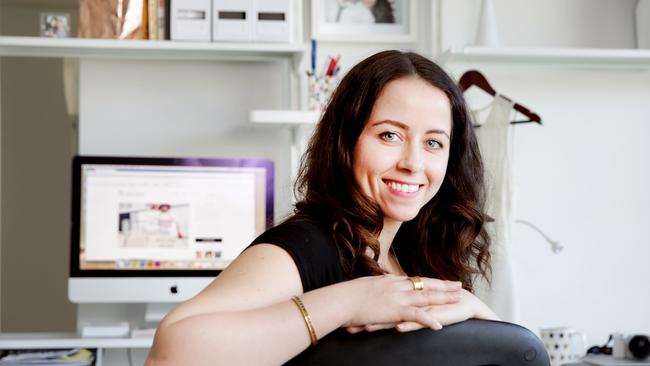
VIC News
Don't miss out on the headlines from VIC News. Followed categories will be added to My News.
WHEN Emilia Rossi imagines her dream life, she does not picture herself in an office cubicle, toiling away at a steady job with enforced hours. “In my early 20s, I had a job as an exhibition designer in an office and I hated it,” Rossi says. “I remember thinking that this couldn’t be life, that there had to be more to it than this.”
In addition to disliking the work, Rossi found the idea of relying on one income to pay the bills hopelessly outdated, akin to investing all your superannuation funds in one risky stock.
“I had this epiphany at the age of 26 that that was not a smart way to live and so I quit my job,” the 33-year-old Melburnian says.
Rossi set up a business with her mother, selling imported leather goods via both a bricks-and-mortar store and online.
She ran the business for four years but wound it up in 2011 after it “was no longer viable”.
“It was during the post-GFC climate and they were very hard business conditions, but I learned so much about businesses and how to run one.
“I threw myself in the deep end and after that I was able to launch new projects within weeks of an idea.”
Rossi has spent the past five years supplementing her major line of work as a freelance digital consultant with three new ideas that have turned into solid incomes: her fashion and lifestyle blog, her range of handmade jewellery she wholesales, and
a wedding classifieds website.
The wedding site, Capriess, was launched in 2011 after Rossi struggled to find decent second-hand wedding attire for her big day.
“I am quite thrifty so I checked out what was out there and the sites were terrible,” she says.
Capriess offers stylish, second-hand wedding attire to budget-conscious brides-to-be, and the site has been steadily earning money from day one.
Listers are charged $4.95 ($7.95 for the home page), and Rossi admits she rarely has to devote much time to it, though she is planning on expanding the website
to include wedding industry services. She has about 300 listings at any given time.
“The website has got so much potential I am going to redevelop it over the coming months,” she says.
Then there is her fashion and lifestyle blog, Emilia Rossi, which has attracted the attention of big brands.
She offers advertising space on her blog as well as “sponsored posts” for $500 per article.
It is not unheard of, she notes, for bloggers with a high volume of readers to charge up to $4000 per blog post.
Rossi also generates extra money by making jewellery, which she sells on online craft and arts marketplace Etsy, and distributes to more than 15 stores across the country.
“I think part of my success has been that I used my digital freelance experience to set up websites that will rank highly in Google and will attract attention. The trick is being able to leverage the skills that you have already and apply them in many areas.”
Melbourne businesswoman Jo Munro is equally adept at getting the most from her professional skills.
The 52-year-old spent 15 years as a channel manger with Telstra before taking a package a few years ago to focus on freelance business coaching.
It was around this time that she discovered the money-making power of selling through online
market site eBay.
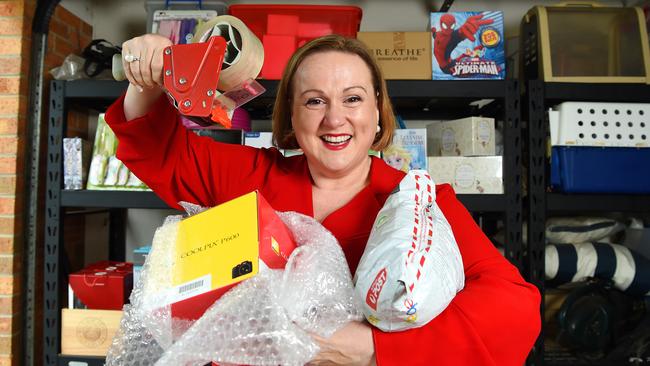
“I was rolling out these courses for people who wanted to learn how to make money off eBay, essentially eBay education packs, across the UK,” Munro says. “For a long time, I viewed eBay as a kind of junkyard of shopping, but then I saw how there was so much profit to be made.
“In Australia alone, eBay receives seven million unique hits a month.”
Munro set up three stores on eBay — offering children’s books, kitchen items and popular gardening implements — and began moving stock immediately.
A long-time shopaholic, Munro scours the sales for bargains and stocks up at
discount giant Costco, before onselling through eBay for a tidy profit.
In one lucrative sales spree, she bought Jamie Oliver mortar and pestle implements in the Christmas sales for $8 a piece and sold them for $39.99 each.
Heston Blumenthal’s lavish cookbook Big Fat Duck retails for $299, but Munro picked them up at Costco for $139 and sold them for $249 online.
Munro, based in Bundoora, employs two mums to help her a few days a week with the picking and packing of stock, and earns between $10,000 and $15,000 a month from each of her three eBay stores.
She has even begun manufacturing her own garden implements out of China, importing them and selling them through the site.
“My housekeeper speaks Mandarin and she has taught me how to speak the language, so that has
come in handy,” Munro says.
“It honestly doesn’t feel like work what I do, I would be out shopping anyway.”
That is not to suggest there is not a fair degree of savvy behind Munro’s business venture.
She adds value to each of her purchases by creating “bundles”, which are all beautifully wrapped.
For instance, the Big Fat Duck cookbooks came with a free kitchen bonus pack of spatulas and tea towels, worth $19, but Munro managed to source for about $5.
Furthermore, Munro ensures all the products she sells are easy to ship — she has steered clear of fashion as there are too many returns — and has set up email updates for past customers to offer deals and discounts.
If it sounds time-consuming, Munro points out that people can always choose how much time they want to devote to selling on eBay.
“I say to people that they can either make a few hundred dollars a week to help cover bills or they can use it to replace an income,” she says. “It’s up to them.”
St Kilda dad Chris Appleford has also found a new online income — one that was born out of a gnawing desperation to change his career.
Appleford was in a happy marriage with wife Sarah and together they were operating a successful chocolate powder company while running after their 18-month-old son Jack.
It should have been the time of his life, but Appleford felt something was missing.
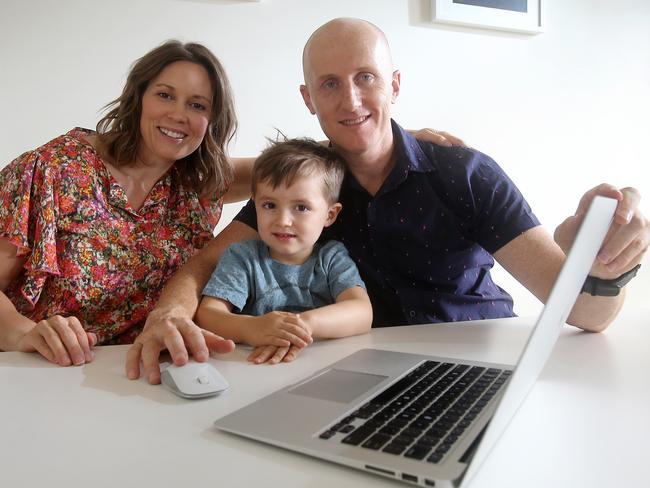
He had tried many careers — including media manager for the Melbourne Storm and as a teacher — but he wasn’t feeling inspired by his work.
Two years ago, he made a momentous decision.
“I sat down to dinner one night and told Sarah that I thought we should sell all of our possessions and travel overseas,” the 42-year-old says. “She was actually very receptive to the idea. Neither
of us were passionate about what we were doing at that point so we went for it.”
Appleford knew how hard it would be to travel with a young child, but was prepared for the warts-and-all adventure.
The family rented out their home and moved to Southeast Asia, where Appleford got a job teaching English at a school in Chiang Mai.
Sarah, who was unable to put her interior design background to use, built an online profile on international freelancing site Upwork, and started writing articles for business websites.
After two months, they moved to Abu Dhabi, in the United Arab Emirates, and, despite being offered a lucrative teaching job, Appleford joined the Upwork community instead.
“I didn’t want to take the teaching job because I had turned my back on teaching for a reason,” Appleford says. “So I built an Upwork profile and started working for clients while we travelled.”
At first, the pay was paltry — about $11 an hour — but a few five-star reviews followed and both of them were able to lift their rates in no time.
These days, Appleford is able to charge $75 an hour, but has heard of specialist and very experienced freelancers charging $130.
The pair used their Upwork income to travel to Europe and took house-sitting jobs to help keep costs down. At one point they landed a job house-sitting a 90-room chateau in rural France.
After a year, the couple returned to Australia to work and save, and are planning their next overseas trip at the end of 2018.
In the meantime, the pair are still working furiously via Upwork, and doing courses on the side.
“It was the best experience and we are really looking forward to doing it all over again,” Appleford says. “My advice for others would be not to quit
their job straight away but to start building an Upwork profile and ease into it part-time.”
Even if you are not planning on a job change or funding travel ambitions, a secondary income can make a big difference to your bottom line.
Jaiwardhan Puri, 34, and wife Khushboo Gupta, 29, began renting out their huge shed in the backyard of their Tarneit property four months ago. “We were basically looking for a way to make a bit of money on the side and my husband started searching for ideas on the internet,” Gupta says.
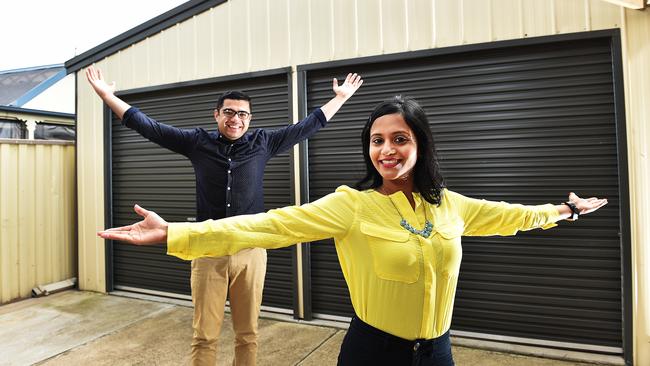
They found a site called Spacer, which allows people to list their spare spaces for rent.
The couple now rents out their large, unused shed to a client who stores his SUV and caravan. The listing nets the couple $200 a month, which they use to pay utility bills.
“We did consider renting out a spare room through Airbnb but we didn’t really know the quality of person we would be getting,” Gupta says.
“With the garage, we just need 24 hours’ notice and the renter can access the shed from the side
of the property.
“It has been no hassle at all, and he has only needed access once in four months.”
Gupta says she was surprised their plan to bring in some extra money was so easy to pull off.
“We have a large space, but you don’t need that much space in order to rent it out and earn some money,” she says.
“Lots of people can do what we are doing.”

THE UBER DRIVER
YAJA Nowakowski is one of those people who has lived a thousand lives.
She’s taught English in Indonesia and Poland, joined the police force at 46 and was the CEO of a remote Aboriginal community.
Now she’s an Uber-driving life coach.
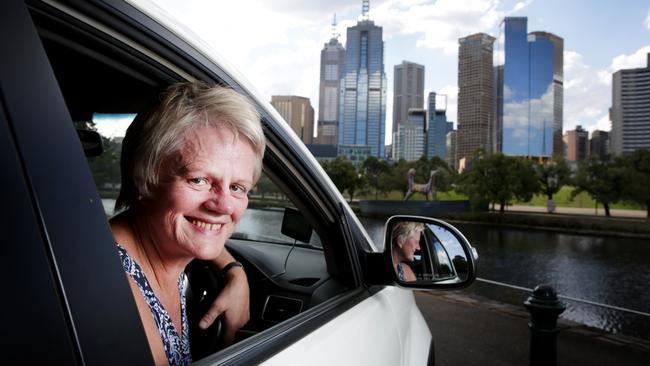
Since last May, Nowakowski has completed about 3000 trips for the drive-sharing service.
She works about 60 hours a week in her 2014 SsangYong 4WD, and after Uber takes its 20 per cent cut, she takes home $1200-$1500.
Driving for the company gives her the flexibility and independence to be her own boss as she sets up her home-based life-coaching business. It also affords her time with her much-loved dogs, Molly and Bobbi, and she likes the networking aspect of driving passengers.
“I’ve lived in every state in Australia and have had lots of addresses and jobs,” the 57-year-old says. “I’ve been a bit of a nomad but it’s time to settle down and stay put.
“I love the freedom to choose my hours. I also love to hear people’s stories and they love
to hear mine so it ends up being a mutual exchange.”
The Seaford resident prefers to work nights when traffic is less congested and passengers are more relaxed.
She likes that drivers don’t handle cash or credit cards when taking a fare and feels very safe as a female working solo.
“A lot of young fellows say it’s just like their mum giving them a lift, which is nice,” Nowakowski says. “It’s like I’m their friend or family member who they’ve asked to give them a lift.
“I’ve probably had 10 to 15 people I’ve considered rude or disrespectful but it’s usually their friends not them, so the friends probably don’t know how it works in terms of me giving passengers a rating out of five, and vice versa.
“I’ve had some aggressive people, but nothing on what I dealt with as a police officer. Everyone’s an angel.”
RENTING OUT YOUR HOUSE
BEING house proud as well as entrepreneurial is paying off for Clint Magill.
The 39-year-old, who works in the fashion industry, has been renting out his Port Melbourne apartment as holiday accommodation on house-sharing website Airbnb since February.
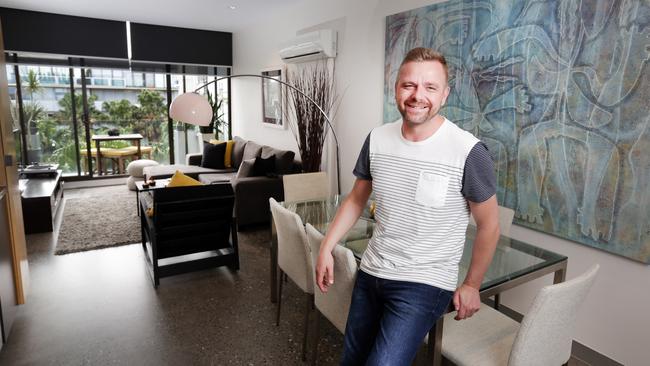
His one-bedroom, one-bathroom, fourth-floor pad is one of 10,000 listings across Melbourne.
He’s had two sets of guests stay, charging them $117 a night, with Airbnb taking a
3 per cent cut.
Magill lists the apartment’s best features as its proximity to the city, the Spirit of Tasmania, Port Melbourne’s cafes and bars, and the beach, which is 250m away. Guests also have access to the complex’s pool and gym.
He rents out the apartment on weekends, staying with his parents in Torquay when it’s occupied.
Several neighbours in his block have also listed their abodes on Airbnb, and Magill says building management is amenable.
He doesn’t charge a cleaning fee, preferring to clean the apartment himself once
guests vacate.
Both sets of guests have reviewed him positively.
Magill plans to use his Airbnb income on remodelling the apartment’s kitchen and bathroom.
“I’d absolutely recommend it as a way of bringing in extra money. I don’t find it weird that people stay in my house. I get to cherry pick them, which is great.
“I’ve rejected a few people based on their bad reviews and wouldn’t let any more than two people stay at once.”
Airbnb’s Australian general manager, Sam McDonagh, says 84 per cent of hosts list their primary residence and the average annual income generated in Victoria is $7100.
“The impact can often be life changing,” he says. “Our hosts tell us this extra income helps pay off the mortgage, cover bills and household expenses. Others list their home to pay for their own holiday away with the family once or twice a year.”
— Megan Miller


